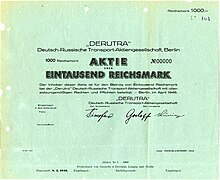German-Russian transport company
The Derutra (German-Russian transport corporation), later Deutrans, was a bilateral freight forwarding - and transport companies of the Soviet Union and Germany in the period of the Weimar Republic , the Third Reich along with the founding in 1946 in the Soviet occupation zone and the GDR .
history
Foundation and continuation until the Second World War
The Derutra was a result of the Treaty of Rapallo on 13 May 1921 by the Soviet trading company Stamonjakaw and the German HAPAG founded to meet the increasing trade exchange between the German Reich and Soviet Russia to coordinate (from the end of 1922 the Soviet Union). On the one hand, the German Reich was interested in oil from the Soviet Union; on the other hand, the Soviet Union expressed a strong interest in German industrial plants. HAPAG left in 1926 ; until 1934 the Derutra operated under Soviet direction.
Development as Deutrans in the GDR
After the Second World War , the Soviet Military Administration in Germany (SMAD) needed a forwarding company that carried out dismantling transports and ensured all foreign trade transports between the Soviet occupation zone in Germany and the Soviet Union. Therefore, the "Derutra" was re-established on March 26, 1946 in East Berlin .
At first it acted as a pure freight forwarder , i. In other words , it commissioned the state- owned motor transport companies to carry out the transports. Vehicles that had remained intact during the war or were taken over from the Soviet military were used. In 1947 Derutra transported parts of the Nazi looted gold on to the Soviet Union. In 1950 the VVB "Deutsche Spedition" was founded. The VEB "Deutsche Spedition" was subordinate to you in the individual districts, which in turn had their own vehicle fleets. The "Deutsche Spedition" was responsible for carrying out the transports to the non-socialist economic area.
Obtaining suitable trucks remained one of the biggest problems. It was not until 1952 that the GDR commercial vehicle industry succeeded in bringing the first usable truck onto the market with the IFA H6 . As early as 1959, the construction of heavy commercial vehicles in the GDR was completely stopped. For the time being, only Škoda from Czechoslovakia was able to offer trucks that were suitable for imports from the “ brother countries ” . That is why vehicles had to be procured from the west, including from the manufacturers Mercedes-Benz , Magirus-Deutz and Volvo .
In 1954, DEUTRANS - Internationale Spedition was founded. This acted as a pure forwarding agent and commissioned the state-owned motor transport companies and the Deutsche Reichsbahn , but also shipping companies, with the execution of the transport. Most of the transports were carried out by rail. From the 1960s, however, it was no longer possible to ignore the international trend towards road transport. The shortage of foreign exchange turned out to be a serious problem for the procurement of corresponding vehicles.
At that time, it was not expected that the foreign currency invested would be amortized. Therefore, one tried initially to conduct business on a compensation basis. Since the GDR industry had lively economic relations with Sweden, machines were exchanged for Volvo trucks - initially the Volvo F88 / F89 , then also the F10 and F12 at the end of the GDR.
Development after 1989
In 1990, very quickly after German reunification , Deutrans was taken over by Kuehne + Nagel .
Web links
literature
- Arnold D. Margolin: From a Political Diary: Russia, the Ukraine and America 1905-1945 . Columbia University Press, New York 1946.
- Federal Ministry for All-German Issues (ed.): SBZ from A to Z: a pocket and reference book about the Soviet zone of occupation. 4th edition Deutscher Bundes-Verlag, Bonn 1958.
- Zeitschrift Historischer Kraftverkehr Edition 2/2010 April / May.
- Christian Suhr: The Deutrans story. Kraftakt publishing house, 2010.
Individual evidence
- ↑ Scripophily.ru Ancient Russian Securities
- ^ Adrian Levy, Catherine Scott-Clark The Amber Room, The Untold Story of the Greatest Hoax of the Twentiest Century 2004 pp. 128f
- ↑ Freight traffic. Politischer Sturm , Der Spiegel 42/1990, October 15, 1990 , accessed on April 18, 2015
- ↑ There the same crap is done , Der Spiegel 25/1990 of June 18, 1990 , accessed on April 18, 2015


